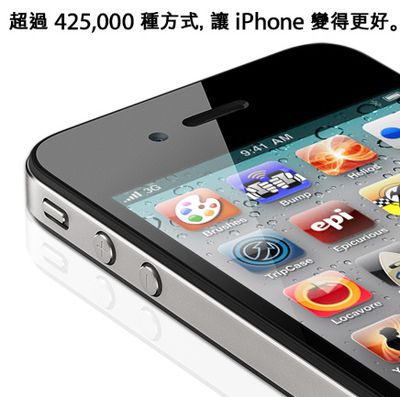Apple Tweaks Taiwanese App Store Terms to Formalize 7-Day Return Policy
Late last month, we noted that Apple had reportedly begun offering a seven-day window for "returns" on App Store purchases in Taiwan, a move made in response to a notice from government officials requiring Apple to comply with consumer protection laws requiring such return policies.

As reported by IDG News, Apple has now formalized that policy, updating its terms and conditions for the Taiwanese Mac App Store, App Store, and iBookstore earlier this week to include language outlining the policy.
You may cancel your purchase within seven (7) days from the date of delivery and iTunes will reimburse you for the amount paid, provided you inform iTunes that you have deleted all copies of the product. Upon cancellation you will no longer be licensed to use the product. This right cannot be waived.
The change appears to be unique to the Taiwanese market, with Apple's terms and conditions documents for its stores in other countries making no mention of a similar policy. Apple does, however, routinely judge refund requests on a case-by-case basis and will frequently issue refunds for purchases made in error or in other select situations. Apple has even been said to be offering refunds on its own Final Cut Pro X apps to those customers dissatisfied with their purchases.
Google, which currently offers a standard 15-minute refund policy on Android app purchases, has resisted complying with the regulations, disagreeing with the government's interpretation of the consumer protection act. The city of Taipei has already fined Google nearly $35,000 over its failure to comply, and the company has appealed that fine as the two sides continue to discuss the situation.
Popular Stories
Despite being more than two years old, Apple's AirPods Pro 2 still dominate the premium wireless‑earbud space, thanks to a potent mix of top‑tier audio, class‑leading noise cancellation, and Apple's habit of delivering major new features through software updates. With AirPods Pro 3 widely expected to arrive in 2025, prospective buyers now face a familiar dilemma: snap up the proven...
If you have been experiencing issues with wireless CarPlay in your vehicle lately, it was likely due to a software bug that has now been fixed.
Apple released iOS 18.4.1 today, and the update's release notes say it "addresses a rare issue that prevents wireless CarPlay connection in certain vehicles."
If wireless CarPlay was acting up for you, updating your iPhone to iOS 18.4.1 should...
Apple's iPhone development roadmap runs several years into the future and the company is continually working with suppliers on several successive iPhone models simultaneously, which is why we often get rumored features months ahead of launch. The iPhone 17 series is no different, and we already have a good idea of what to expect from Apple's 2025 smartphone lineup.
If you skipped the iPhone...
Apple is preparing a "bold" new iPhone Pro model for the iPhone's 20th anniversary in 2027, according to Bloomberg's Mark Gurman. As part of what's being described as a "major shake-up," Apple is said to be developing a design that makes more extensive use of glass – and this could point directly to the display itself.
Here's the case for Apple releasing a truly all-screen iPhone with no...
While the iPhone 17 Pro and iPhone 17 Pro Max are not expected to launch until September, there are already plenty of rumors about the devices.
Subscribe to the MacRumors YouTube channel for more videos.
Below, we recap key changes rumored for the iPhone 17 Pro models as of April 2025:
Aluminum frame: iPhone 17 Pro models are rumored to have an aluminum frame, whereas the iPhone 15 Pro and ...
The first iOS 19 beta is less than two months away, and there are already a handful of new features that are expected with the update.
Apple should release the first iOS 19 beta to developers immediately following the WWDC 2025 keynote, which is scheduled for Monday, June 9. Following beta testing, the update should be released to the general public in September.
Below, we recap the key...
Apple today released tvOS 18.4.1, a minor update to the tvOS 18 operating system that came out last September. tvOS 18.4.1 comes two weeks after Apple released tvOS 18.4, and it is available for the Apple TV 4K and Apple TV HD models.
tvOS 18.4.1 can be downloaded using the Settings app on the Apple TV. Open up Settings and go to System > Software Update to get the new software....
This week saw rumor updates on the iPhone 17 Pro and next-generation Vision Pro, while a minor iOS 18.4.1 update delivered not just security fixes but also a fix for some CarPlay issues.
We also looked ahead at what else is in Apple's pipeline for the rest of 2025 and even the 20th-anniversary iPhone coming in 2027, so read on below for all the details on these stories and more!
iPhone 17 ...
Apple TV+ is currently available at a much lower price than usual, but time is running out if you want to take advantage of the offer.
In the U.S., new and qualified returning customers can subscribe to Apple TV+ for just $2.99 per month, for three months. Afterwards, regular pricing of $9.99 per month applies. The offer is available in the Apple TV app, and at tv.apple.com, through April...
























